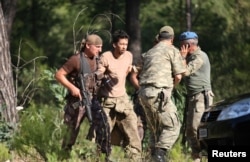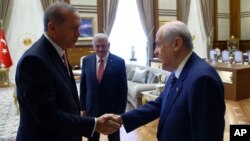Speculation is growing that the stalled peace process between the Turkish government and the Kurdish rebels could resume after its breakdown last year.
Two main factors fuel that belief. For one, nearly half of Turkey's top generals have been removed from office in connection with the failed coup attempt earlier this month, yet despite the Turkish military's disarray, the PKK Kurdish rebel group has not launched any major attacks. In addition, Turkey's main pro-Kurdish party joined other opposition parties in opposing the putsch.
General Adem Huduti, the commander of Turkey's Second Army, is the most senior among the military officers detained in the ongoing crackdown on coup plotters. Huduti has led counter-insurgency operations against the PKK since fighting resumed following last year's collapse of the government-backed peace process with the rebels.
Many of Turkey's elite special forces and commandos who have been at the forefront of the fight against the PKK have also been detained. Yet the rebels have not moved to take advantage of the chaos within the Turkish military.
"I liken what happened to a massive stroke, so the body is extremely weak, it is unable to truly protect itself," said Soli Ozel, an international relations expert at Istanbul's Kadir Has University. "So I am happy that the PKK is not doing anything, but I don't know whether there has been [any] kind of communication."
Possibility of peace
Turkey's air force, which regularly bombs the PKK, has only launched one strike against rebel bases in neighboring northern Iraq since the failed coup. While PKK skirmishes are still continuing five police officers and soldiers were killed in separate attacks Thursday in the predominantly Kurdish southeast.
Ayse Sozen Usluer, the Turkish president's international relations chief, insists there has been no change in policy toward the PKK, but does not rule out that the conflict can be resolved politically.
"There is always [the] possibility to go back to [the] peace process," he said.
The peace process with the PKK collapsed in July amid mutual recriminations.
Its failure led to a resumption of fighting that caused massive destruction in towns and cities across Turkey's predominantly Kurdish southeast, along with claims by human rights groups of widespread abuses. But Selahattin Demirtas, co-leader of the HDP, Turkey's main pro-Kurdish party, was quick to condemn the coup attempt, and many Kurds heeded Turkish President Recep Tayyip Erdogan's call to go to the streets to oppose it.
Wait-and-see approach
Semih Idiz, a political columnist with Turkey's Cumhuriyet newspaper, says the PKK is taking a wait-and-see approach.
"It's obvious it [the PKK] is holding back to see how all this plays out," he said. "Now, it would not be too pleased at the fact the president is not willing to meet the HDP leader while he is prepared to meet other opposition leaders, even though the HDP came out against the coup. But I think there is a possibility that the government under these conditions will try and go back to some kind of negotiation process with the Kurds or PKK. And perhaps that is why [the] PKK is laying low at the moment."
HDP co-leader Demirtas strongly condemned his exclusion from Erdogan's meeting Monday with parliamentary opposition leaders. However, Prime Minister Binali Yildirim suggested the HDP could be brought into what the government calls a consensus-building process.
"If there is a kind of undeclared cease-fire for some time, it may be easier to actually include them [Kurds] in the process, as well," Ozel said.
In what analysts say is an important gesture to the Kurdish minority, the government says it is considering reopening an investigation into the deaths of 34 young Kurdish smugglers four years ago in a Turkish airstrike near Uludere, on Turkey's border with Iraq.






